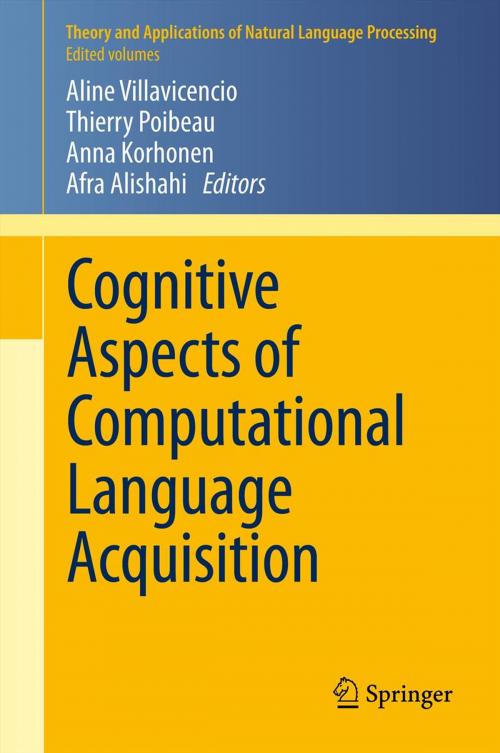Cognitive Aspects of Computational Language Acquisition
Nonfiction, Computers, Advanced Computing, Artificial Intelligence, General Computing| Author: | ISBN: | 9783642318634 | |
| Publisher: | Springer Berlin Heidelberg | Publication: | January 11, 2013 |
| Imprint: | Springer | Language: | English |
| Author: | |
| ISBN: | 9783642318634 |
| Publisher: | Springer Berlin Heidelberg |
| Publication: | January 11, 2013 |
| Imprint: | Springer |
| Language: | English |
Questions related to language acquisition have been of interest for many centuries, as children seem to acquire a sophisticated capacity for processing language with apparent ease, in the face of ambiguity, noise and uncertainty. However, with recent advances in technology and cognitive-related research it is now possible to conduct large-scale computational investigations of these issues
The book discusses some of the latest theoretical and practical developments in the areas involved, including computational models for language tasks, tools and resources that help to approximate the linguistic environment available to children during acquisition, and discussions of challenging aspects of language that children have to master.
This is a much-needed collection that provides a cross-section of recent multidisciplinary research on the computational modeling of language acquisition. It is targeted at anyone interested in the relevance of computational techniques for understanding language acquisition. Readers of this book will be introduced to some of the latest approaches to these tasks including:
* Models of acquisition of various types of linguistic information (from words to syntax and semantics) and their relevance to research on human language acquisition
* Analysis of linguistic and contextual factors that influence acquisition
* Resources and tools for investigating these tasks
Each chapter is presented in a self-contained manner, providing a detailed description of the relevant aspects related to research on language acquisition, and includes illustrations and tables to complement these in-depth discussions. Though there are no formal prerequisites, some familiarity with the basic concepts of human and computational language acquisition is beneficial.
Questions related to language acquisition have been of interest for many centuries, as children seem to acquire a sophisticated capacity for processing language with apparent ease, in the face of ambiguity, noise and uncertainty. However, with recent advances in technology and cognitive-related research it is now possible to conduct large-scale computational investigations of these issues
The book discusses some of the latest theoretical and practical developments in the areas involved, including computational models for language tasks, tools and resources that help to approximate the linguistic environment available to children during acquisition, and discussions of challenging aspects of language that children have to master.
This is a much-needed collection that provides a cross-section of recent multidisciplinary research on the computational modeling of language acquisition. It is targeted at anyone interested in the relevance of computational techniques for understanding language acquisition. Readers of this book will be introduced to some of the latest approaches to these tasks including:
* Models of acquisition of various types of linguistic information (from words to syntax and semantics) and their relevance to research on human language acquisition
* Analysis of linguistic and contextual factors that influence acquisition
* Resources and tools for investigating these tasks
Each chapter is presented in a self-contained manner, providing a detailed description of the relevant aspects related to research on language acquisition, and includes illustrations and tables to complement these in-depth discussions. Though there are no formal prerequisites, some familiarity with the basic concepts of human and computational language acquisition is beneficial.















